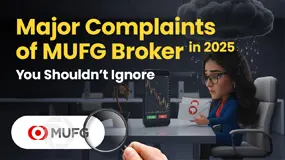A Russian national is accused of $31 million US Stock Manipulation Scam.
Abstract:A Russian national, Dmitrii Kushnarev, has been accused by the U.S. Securities and Exchange Commission (SEC) of orchestrating a $31 million securities fraud scheme that spanned more than seven years. According to regulators, Kushnarev hacked into hundreds of brokerage accounts in the United States, manipulating stock and options prices to generate illicit profits

A Russian national, Dmitrii Kushnarev, has been accused by the U.S. Securities and Exchange Commission (SEC) of orchestrating a $31 million securities fraud scheme that spanned more than seven years. According to regulators, Kushnarev hacked into hundreds of brokerage accounts in the United States, manipulating stock and options prices to generate illicit profits.
The Allegations Against Dmitrii Kushnarev
The SEC complaint details how Kushnarev allegedly used 23 false identities, including fake European citizenships, to open dozens of trading accounts across multiple platforms. By doing so, he avoided detection and carried out what investigators describe as a highly sophisticated “account takeover attack” operation.
Through these compromised accounts, Kushnarev is accused of placing fraudulent trades that manipulated prices in his favor, leading to massive losses for unsuspecting U.S. investors and brokerage firms. The total damage is estimated at over $31 million.
A History of Fraud
This is not Kushnarevs first run-in with the law. Court records indicate that he previously served a prison sentence in Russia between 2002 and 2004 for fraud-related offenses. His repeated use of multiple false identities appears to have been a consistent method of concealing his involvement in fraudulent schemes.
The SEC alleges that in this most recent case, Kushnarevs pattern of deception involved systematically creating fake personas, exploiting brokerage systems, and taking advantage of vulnerabilities to maximize illegal gains while evading detection.
How the Scam Worked
The scheme reportedly unfolded in three steps:
- Account Takeover – Kushnarev and his associates allegedly gained unauthorized access to U.S. brokerage accounts through hacking or stolen credentials.
- Price Manipulation – They then executed trades designed to manipulate the prices of certain stocks and options.
- Profit Extraction – Using his own accounts registered under fake identities, Kushnarev would place corresponding trades to benefit from the manipulated market moves.
This fraudulent cycle continued for seven years, according to investigators.
SECs Response and Legal Action
The SEC has formally charged Kushnarev with violating multiple provisions of U.S. securities law. If convicted, he could face significant fines, asset seizures, and a permanent ban from U.S. financial markets.
Authorities also stressed that account takeover attacks remain a serious threat to brokerage firms and retail investors, underscoring the importance of strong cybersecurity protocols and vigilance against suspicious activity.
Conclusion
The case of Dmitrii Kushnarev serves as a stark reminder of how sophisticated fraudsters can exploit financial systems for personal gain. Despite past convictions, Kushnarev allegedly continued his criminal path, costing investors tens of millions of dollars.
With the SEC stepping in, the financial world awaits further developments in what could become one of the most notable international stock manipulation scams in recent years.

Read more

How a Fake Moomoo Ad Led to the “New Dream Voyage 5” Scam
A young engineer’s RM247,000 loss into a scam posing as Moomoo raises a chilling question: how many more are already trapped without realising it?

Vietnam Forex Fraud Kingpin Arrested in Philippines
Vietnam forex fraud suspect Le Khac Ngo arrested in Philippines as authorities uncover record-breaking cross-border investment scam.

Major Complaints of MUFG Broker in 2025 You Shouldn’t Ignore
2025 is about to end, and if you still want to be a trader or investor and are looking for a broker to invest with. It is important to read real user complaints first. This will help you understand the kind of problems users are facing with MUFG broker. In this article, we will tell you about the major complaints users have reported about MUFG in 2025, so you know what to watch out for. Do not ignore this MUFG broker article and understand the problems.

Binolla Reviews & Complaints: Analysis of Risks & Red Flags
The first question you should ask before choosing any forex broker for trading or investment purposes is simple: Is it legitimate and safe to trade with? This article examines the broker Binolla, looking into its regulatory status, Binolla Trading App, and real user complaints.
WikiFX Broker
Latest News
Is Axi Legit? A Data-Driven Analysis of Its Regulatory Standing and Trader Feedback
How a Fake Moomoo Ad Led to the “New Dream Voyage 5” Scam
WikiFX's New Evaluation of ATM Capital LTD: Does its License Protect the Arab Investor?
Bessent believes there won't be a recession in 2026 but says some sectors are challenged
Is GGCC Legit? A Data-Driven Analysis for Experienced Traders
In-Depth Review of INZO Trading Conditions and Product Offering – A Data-Driven Analysis
B2BROKER Gains Investment Bank Status in Labuan
Rate Calc

